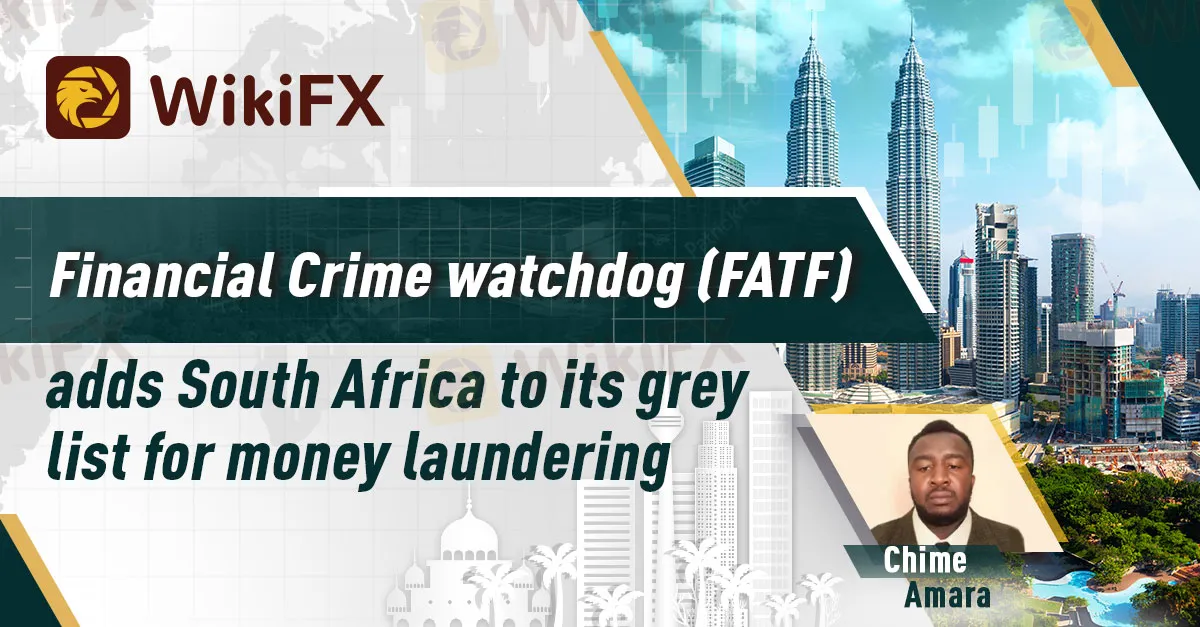简体中文
繁體中文
English
Pусский
日本語
ภาษาไทย
Tiếng Việt
Bahasa Indonesia
Español
हिन्दी
Filippiiniläinen
Français
Deutsch
Português
Türkçe
한국어
العربية
Financial Crime watchdog (FATF) adds South Africa to its grey list for money laundering
Abstract:The Financial Action Task Force (FATF) has added South Africa and Nigeria to its watch list for money laundering.

By: Chime Amara

In a move that has sent shockwaves through the financial industry, the has added South Africa to its grey list for money laundering, alongside Nigeria. The decision was made during a plenary session held by the international watchdog in Paris on February 24, 2023.
The grey list is a warning to countries that their financial systems are not up to scratch when it comes to combating money laundering and terrorist financing. Being on the grey list means that financial institutions operating in South Africa will face increased scrutiny, making it more difficult for them to do business internationally.
This is a blow to South Africa, which has been trying to improve its reputation as a financial hub and attract investment to its struggling economy. It is also a setback for the country's efforts to combat corruption and financial crime.
The FATF stated that South Africa has made progress in implementing its action plan to address the deficiencies in its anti-money laundering and counter-terrorist financing regime. However, the watchdog also noted that more needs to be done to fully address the identified weaknesses.
The South African government has responded to the news by saying that it is committed to working with the FATF to address the issues and to fully implement the necessary measures. The government has also emphasized that it takes the fight against financial crime and corruption very seriously.
The decision by the FATF to put South Africa on its grey list comes at a time when there is increasing global concern about the links between financial crime and terrorism. The international community is increasingly focused on preventing money laundering and terrorist financing, and countries that are seen as not doing enough to combat these threats risk being ostracized by the international financial community.
It remains to be seen what impact this decision will have on South Africa's economy and reputation as a financial center. However, the government will need to take swift action to address the issues identified by the FATF if it is to avoid further damage to its reputation and the wider economy.

Disclaimer:
The views in this article only represent the author's personal views, and do not constitute investment advice on this platform. This platform does not guarantee the accuracy, completeness and timeliness of the information in the article, and will not be liable for any loss caused by the use of or reliance on the information in the article.
Read more

Philippines Deports 29 Indonesians Linked to Online Scam Syndicate in Manila
Online scam groups in the Philippines trick Filipinos into gambling and love scams, from Manila to Bacolod, causing trafficking and pain as police fight back.

Why does your mood hinder you from getting the maximum return from an investment?
Investment decisions are rarely made in a vacuum. Aside from the objective data and market trends, our emotions—and our overall mood—play a crucial role in shaping our financial outcomes. Whether you’re feeling overconfident after a win or anxious after a loss, these emotional states can skew your decision-making process, ultimately affecting your investment returns.

Top Currency Pairs to Watch for Profit This Week - March 31, 2025
Discover the top 5 currency pairs to trade for profit this week, March 31, 2025—USD/JPY, EUR/USD, GBP/USD, AUD/USD, USD/CHF—with simple strategies and best times.

Stock Market Trading Volume Drops by 97.58 Billion Naira This Month
In February, Nigeria's stock market trading volume dropped by 97.58 billion naira, with foreign investors pulling back. Can domestic investors sustain the market?
WikiFX Broker
Latest News
How Crypto Trading Transforms FX and CFD Brokerage Industry
UK would not hesitate to retaliate against US tariffs - No 10 sources
FCA Warns Against 10 Unlicensed or Clone Firms
CySEC Warns Against 14 Unlicensed Investment Websites
Top Currency Pairs to Watch for Profit This Week - March 31, 2025
Will natural disasters have an impact on the forex market?
Philippines Deports 29 Indonesians Linked to Online Scam Syndicate in Manila
Navigating the Intersection of Forex Markets, AI Technology, and Fintech
Exposed: Deceptive World of Fake Trading Gurus – Don’t Get Fooled!
AI-Powered Strategies to Improve Profits in Forex Trading
Currency Calculator







